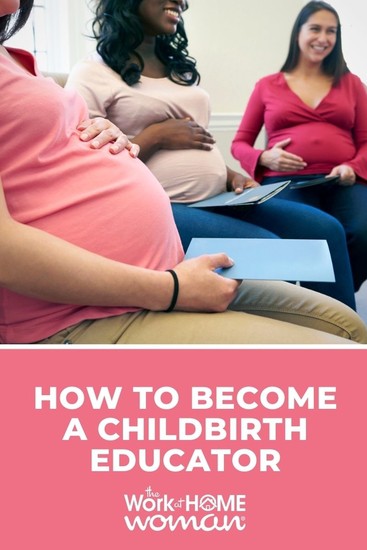Becoming a childbirth educator can be a highly rewarding and transformational healthcare career that you can do from home.
Sound interesting?
To see if this might be the right career path for you, answer these questions:
- Are you passionate about childbirth?
- Has your own birth experience drawn you to this rewarding career path?
- Would you like to empower women with the latest birth information and options available?
- Do you dream of making a difference to families, building their confidence, and reducing their fears in the birthing process?
Did you answer, YES?! Then read on and find out more on how to become a childbirth educator.

What is the role of a childbirth educator?
The International Childbirth Education Association (ICEA) defines childbirth educators as professional sources of information, with skills to support parents as they prepare for pregnancy, labor, birth, and parenthood. ICEA believes that childbirth educators positively impact birth outcomes and parent satisfaction.
A childbirth educator is an advocate and facilitator for families as they transition to parenthood. They advocate for women, ‘promoting the health, autonomy, individuality, and integrity of women as human beings’ (ICEA).
How do I become a childbirth educator?
Becoming a childbirth educator isn’t as difficult as you might expect. You will need to train and gain certification, but first, consider these questions before choosing a program:
- What is your birth philosophy?
- How many hours a week can you dedicate to studying?
- What approach would you prefer the training program to take?
- Would you prefer face-to-face training or online?
- How long will it take to complete the training and become certified?
- Are there essential work placements to become certified?
- How much money do you have to invest in the training?
Once you have answered those questions (it’s a good idea to write them down), you’ll have a better idea about which organization to choose.
Which organizations offer certification?
Now let’s look at three organizations that offer childbirth education certification, and you can consider if they meet your needs.
Bebo Mia Inc
Bebo Mia is a training and mentorship organization for changemakers who want to work, or are already working, in the reproductive health field.
Birth philosophy: Inclusion in reproductive health is one of their top priorities, and their training is approached from an anti-racist, anti-oppressive, trauma-informed, and intersectional lens.
Training approach: A multi-modality approach from a diverse team of instructors, bringing in tools that use mindfulness practices, the social sciences, and coaching strategies.
Duration: Each week for six weeks, a new module will be released that includes all learning styles: videos, slides, handouts, and resources. Your learning will continue during the week in your private support group, which will be there for you beyond the six weeks as you take your first steps as a childbirth educator.
Flexibility: You will have instant access to the program. It’s okay if you can’t keep up with the weekly training; you can go at your own pace and will have lifetime access.
Delivery method: Online with a hands-on feel. You will receive a program outline to teach, which is fully customizable so you can grow your unique style and brand.
Prerequisites: Being a certified doula or birth worker is a prerequisite for this course. If you’re not already a doula, you can bundle your doula training and certified birth educator course with their Maternal Practitioner Training. Find out more here, including the bundle prices.
Costs: There are three payment plans, making it more affordable and accessible. The full price is $679, three payments of $230, or six payments of $120.
Childbirth International
Established in 1998 in response to the lack of training options for doulas, birth educators, and lactation counselors, Childbirth International aims to make certification more accessible for those who have families, jobs, and lives outside their work.
Birth philosophy: Their core values are inclusivity, diversity, and sustainability.
Training approach: Using a multitude of different teaching techniques, you will develop strong communication capability and learn the critical skills of reflective practice and active listening.
Duration: At your own pace, you will complete assignments, exams, teach a class, and complete case studies.
Flexibility: You will be given immediate access to the material, and complete it in your own time.
Delivery method: Choose whether you would like printed manuals or to study online only. You’ll receive a ready-made curriculum in your course and learn how to adapt it to suit your clients’ needs and your personal style.
Prerequisites: None provided.
Costs: The online course costs $905 total or five payments of $191. You may receive discounts if you sign up for multiple classes, and you can sign up for additional optional private mentoring for $127-$375.
CAPPA (Childbirth and Postpartum Professional Association)
CAPPA is an international certification organization for doulas, childbirth educators, and lactation educators. It’s one of the first and most comprehensive perinatal organizations globally and is respected in its longevity and commitment to excellence.
Birth philosophy: You will learn how to offer unbiased perinatal information and provide culturally-sensitive and age-appropriate education.
Training approach: The course utilizes various techniques, skills, and coping strategies that are not limited to a set, static method.
Duration: Go at your own pace.
Flexibility: Complete all requirements within two years of the training class, including the observation of two labors/births that total at least 10 hours.
Delivery method: In-person in at various locations or online (see timetable and locations here). There is also an accelerated course if you’re a certified doula with CAPPA or an RN, CPM, or chiropractor with at least one year of clinical practice.
Prerequisites: Be at least 18 years of age.
Costs: $765 and up, not including the cost of books

Other certification organizations include:
- ICEA (The International Childbirth Education Association)
- Birthworks International
- Birthwell Birthright
Before you finalize your decision on which organization to enroll with, talk to other birth professionals and students who have completed some of these programs. Ask them if they felt supported throughout, if they thought they got their money’s worth, and if all of their needs were met.
How much money does a childbirth educator make?
You can work in various settings offering your services as a public health educator: hospital, community center, private practice, or you can start your own business from home. Many women who teach childbirth classes do so because they are passionate about the field and enjoy helping families. According to Salary.com, the average Childbirth Educator salary in the United States is $68,244 as of September 2020, but the range typically falls between $57,817 and $78,238.
Conclusion
Are you ready to follow your dream of becoming a childbirth educator? Are you excited about the possibility of setting up your own private business where you get the opportunity to share your skills and knowledge of pregnancy, labor, birth, and maternity care systems with your target market?
While you might not necessarily get rich from it, particularly initially, becoming a childbirth educator could supplement your current income. It would make a fantastic additional service or class you teach if you’re already a certified doula or a lactation consultant.
Related Content: How To Become A Doula In 4 Easy Steps
Join the birthing revolution, and provide access to quality, evidence-based education that leads women away from fear and gives them back their confidence in their body’s ability to give birth intuitively.







Leave a Comment